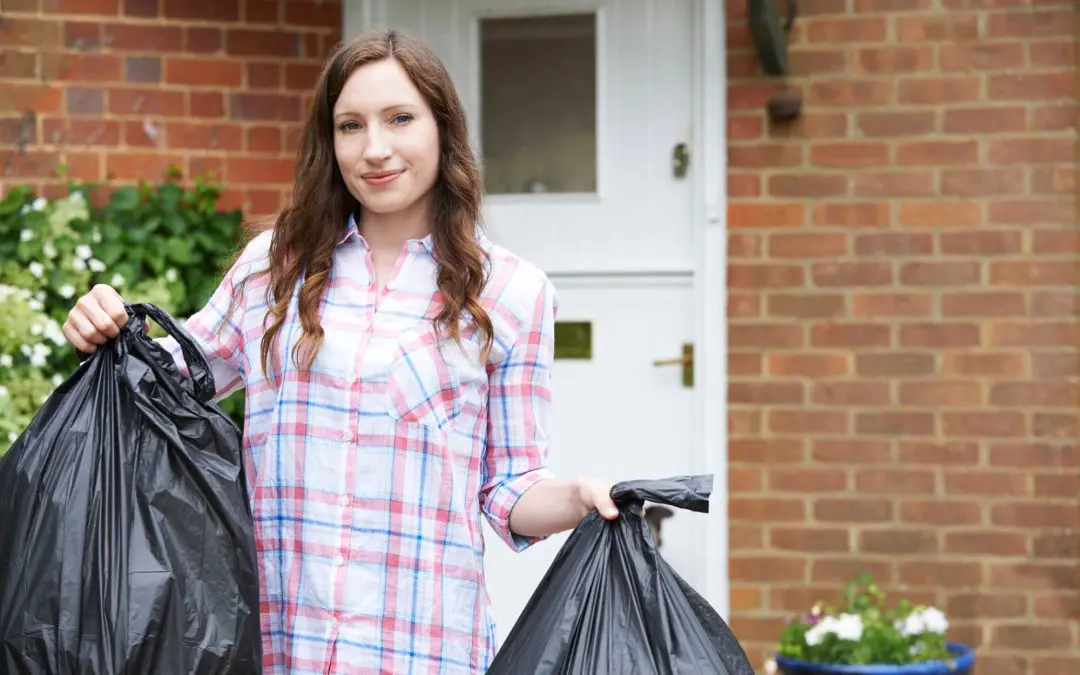In today’s world, finding ways to reduce household waste is one of the most impactful things a homeowner could do. Reducing waste is making smart, confident shifts in consumption that save money, reduce your environmental footprint, and simplify your life. It is easier than you think, and the rewards are worthwhile.
The Biggest Opportunity to Reduce Household Waste
Most of your trash originates in the kitchen, primarily through food packaging and food waste. So, focusing your efforts here will yield the biggest results in your quest to reduce household waste. Start by banning single-use items. Switch from disposable paper towels to cloth rags or microfiber cloths that can be washed and reused endlessly. Replace plastic baggies and cling wrap with reusable containers, silicone bags, or wax wraps for food storage. This simple switch drastically reduces plastic consumption and saves you money over time. When grocery shopping, bring your own bags and consider reusable mesh produce bags instead of the thin plastic ones provided in the store.
Food scraps make up a massive percentage of landfill waste. The most effective way to address this is through composting. Setting up a small compost bin or tumbler in your yard or even a compact indoor system allows you to convert fruit and vegetable scraps, coffee grounds, and yard trimmings into nutrient-rich soil for your garden. For leftovers that don’t get eaten, make a commitment to meal planning. Knowing exactly what you will eat for the week helps you shop smarter and minimizes spoilage, which is one of the most overlooked ways to reduce household waste.
Rethink Your Purchases: Smart Ways to Reduce Household Waste
The best way to eliminate waste is to avoid bringing it into your home in the first place. Every item purchased comes with packaging that will eventually need to be disposed of. Look for opportunities to buy groceries and household items in bulk. Instead of buying small bottles of cleaning solutions, buy concentrated cleaners and reuse the same spray bottle indefinitely. If you have refill stores nearby, take advantage of them for items like soap, shampoo, and detergent. When you do buy packaged goods, prioritize items with minimal packaging or packaging that is easily recyclable (like cardboard or glass). Choosing products packaged in materials with high recycling rates is an excellent strategy to reduce household waste.
Adopt a mindset of buying for quality and longevity over cheap convenience. Before buying something new, ask if it can be found secondhand, borrowed, or repaired. This applies to everything from clothing and furniture to tools and small appliances. Investing in durable goods means you avoid frequent replacements while enjoying higher quality items for longer.
The Bathroom and Cleaning Routine: Eliminating Hidden Waste
Even small changes in the bathroom and your cleaning routine will add up to significant waste reduction over time. The bathroom is a hub for disposable plastics. Replace plastic toothbrushes with bamboo ones, switch from liquid soap in plastic dispensers to bar soap or refillable containers, and use reusable cotton pads instead of disposable wipes. A powerful way to reduce waste here is by switching to solid shampoo and conditioner bars, which eliminate the need for large plastic bottles entirely.
Many conventional cleaning products contain unnecessary chemicals and are sold in single-use plastic bottles. You could make most of your household cleaners using simple, effective ingredients like white vinegar, baking soda, and essential oils. Stored in reusable spray bottles, these solutions are cheaper, safer, and completely eliminate plastic waste from your cleaning routine. By making these confident, intentional swaps throughout your home, you demonstrate that a comfortable, modern lifestyle is fully compatible with a commitment to sustainability, shrinking your garbage bin one smart decision at a time.
Frequently Asked Questions (FAQs)
Is recycling enough to seriously reduce household waste?
While recycling is important, it is the last step in the “Reduce, Reuse, Recycle” hierarchy. The biggest impact comes from reducing consumption and reusing items.
I don’t have a yard. Can I still compost my food scraps?
Yes! Many indoor composting options exist, such as vermicomposting or compact electric composters. Alternatively, check with your local municipality or farmer’s market, as many communities offer collection services or drop-off points for food scrap composting.
How do I know what packaging is truly recyclable in my area?
The most confident way is to check your specific municipal recycling website or contact your local waste management service for a detailed list of acceptable materials.
How should I start if I feel overwhelmed by the need to reduce household waste?
Start small! Choose one area, like the kitchen, and focus on one easy swap, such as switching from paper towels to cloth rags. Once that change becomes a habit, move on to the next. Consistent, small changes are the best ways to reduce household waste sustainably over time.
Brand Name Home Inspections provides inspection services to homebuyers and sellers in Northern California. Contact us to schedule an appointment for our services.

